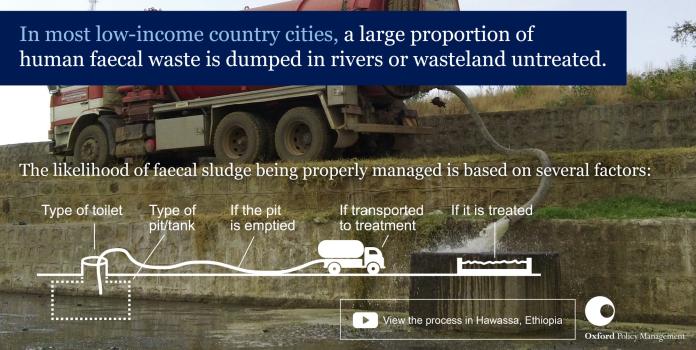Urban sanitation: finding solutions in faecal sludge management
World Water Week is a good time to remember that urban sanitation is a significant challenge for most low- and middle-income countries
-
Date
August 2017
-
Area of expertiseClimate, Energy, and Nature
-
CountriesBangladesh , Bolivia , Ethiopia , Indonesia , Peru
-
KeywordsUrban policy and planning , Water sanitation and hygiene (WASH)
-
OfficesOPM Bangladesh , OPM Indonesia
In most low- and middle-income countries, huge population growth is coupled with rapid urbanisation. In the group of Least Developed Countries in particular, urban population tripled between 1990 and 2015 and sanitation coverage has not kept pace.
While networked systems — consisting of sewerage pipes and treatment facilities — are the preferred sanitation management solution, in reality these are often unaffordable and, in many countries, access to such systems in urban centres is low or non-existent. Instead, on-site solutions like septic tanks or pit latrines are more common and the challenge becomes: how to safely and sustainably manage the resultant ‘faecal sludge’ that develops in such sites? The video above (originally made for World Toilet Day) shows what should be done, following a faecal sludge truck on its journey around Hawassa, Ethiopa, from latrine to drying bed.

We worked on a World Bank funded project, with experts from Loughborough University’s Water, Engineering and Development Centre, to develop innovative policy tools for both diagnosing faecal sludge management problems and guiding appropriate and practical responses. Working in five countries — Indonesia, Bangladesh, Ethiopia, Peru and Bolivia — we gathered city-level socioeconomic data through a variety of methods including household surveys, focus groups and structured observations. And, importantly, while we focused more specifically on the situation in low-income areas, we gathered data that was representative of the cities in their entirety.
In this way, by addressing the wider political economy aspects of faecal sludge management, we are better able to provide stakeholders with the evidence they need to develop inclusive and practical urban sanitation services.
Read our report on faecal sludge management in urban areas.
Read more about faecal sludge management in Hawassa, Ethiopia.
